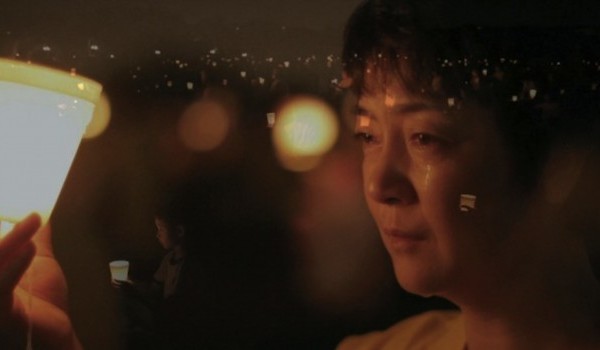
‘Free China’: From Persecution to Hope
The Epoch Times
By Pam McLennan, Epoch Times Staff
August 9, 2012
Free China: The Courage to Believe profiles the lives of two Falun Gong practitioners and the danger and pain they encountered in China in their quest for spiritual freedom.
The absorbing documentary, to be shown at the upcoming Ottawa International Film Festival, begins with Chairman Mao’s elimination of culture, religion, and spiritual values in China so that the Communist Party would become all things to all people.
It then moves on to how Falun Gong was introduced into this moral vacuum in the early 1990s, and explains why and how the persecution of the practice began in July 1999.
Jennifer Zeng and Charles Lee are introduced early in the film. Zeng was a Communist Party member, wife, and mother who was arrested and sent to a labour camp because of her beliefs. She describes what she endured and the insidious tactics used to break her will and spirit to make her renounce her belief in Falun Gong’s principles.
Falun Gong (also known as Falun Dafa) is a spiritual practice from the Buddha school that uses meditation and gentle movements. Adherents follow the principles of truth, compassion, and forbearance to move to higher inner realms and return to their true self.
Lee, born in China but living in the U.S. for many years, says in the film that he felt “a call from my heart” to go to China to help his fellow practitioners and also his countrymen who were misled by the propaganda perpetrated by the regime to demonize Falun Gong and justify its brutal campaign of persecution.
To do that he left behind his fiancée and a comfortable life, willing to give everything he had to do what he could. Eventually he was arrested, and spent three years in a labour camp before returning to the U.S.
Making Connections
The link between Zeng and Lee is producer of the film, Kean Wong. He met Zeng 10 years ago after she had escaped China and was seeking asylum in Wong’s home country of Australia. At the time she was writing a book about her experiences, “Witnessing History: One Woman’s Fight for Freedom and Falun Gong.”
She was the first person Wong met who had actually survived incarceration in a Chinese labour camp and he thought her story was remarkable. In a phone interview Wong, also a Falun Gong practitioner, explains that he lightly commented to Zeng, “Someone is eventually going to do a movie about your story—it’s amazing.” Little did he know it would be him.
Wong met Lee a few years after he moved to Manhattan in 2004 to work with NTD Television, an independent station that beams uncensored information into China via satellite. Wong describes Lee as a “gung-ho American who went to China to free his people. Very selfless, even heroic.”
The film is directed by award-winning documentarian Michael Perlman, who met Wong, now living in the U.S., in 2009 at a fundraiser in Manhattan.
Perlman was in the middle of promoting “Tibet: Beyond Fear.” Wong said, “If you are going to help free Tibet you’ve got to help free China.” To which Perlman replied, “That’s what I’ve been saying.” They shook hands, agreeing to “make a film called ‘Free China,’” Wong explains.
Inspiring Action
The documentary was finally ready early this spring and is being presented at various film festivals, primarily in North America and increasingly in other countries. It is also being translated into 12 languages so it can be seen around the world. It has already won numerous awards.
“I think that at the core of the story it’s about the human experience of freedom. Everyone wants to be free. We want to touch people and inspire people to take action,” says Wong.
“People will know the truth, they will want to stop persecuting Falun Gong. [Everyone] from prison guards to people at the top will realize that you can only destroy your own country if you keep on persecuting good people.”
“Free China” details the role played by American companies in aiding the persecution. It also provides new information that connects China’s widespread human rights violations with systemic unfair trade practices and state-sanctioned forced harvesting of living Falun Gong practitioners’ organs for profit.
“We hope that this film will open the path for people to come to realize what has been happening in China, and eventually to take action to help people inside China,” says Lee.
Thread of Hope
However, also evident is a bright and shining thread of hope, as the film explores how Internet technologies are aiding human rights activists in China and around the world by allowing uncensored information into closed societies. In addition, it highlights how a re-emergence of traditional Chinese culture and spirituality through Falun Gong is helping bring about a new China.
Summing up her feelings about the film, Zeng says, “What I can say is, as human beings, deep in our heart we all long for goodness, kindness, beautiful, and wonderful things; we all long to live at a better place, and be surrounded by kind-hearted people. That’s why many people were drawn to Falun Gong.
“This may sound simple in a normal environment. But in a life-threatening situation, and [Falun Gong practitioners] still having the courage to uphold the principles, then things are different. … Human spirit has more power than guns.”
The Epoch Times is a sponsor of 2012 Ottawa International Film Festival, which runs Aug. 15 to 19. For information about the festival, visit oiff.ca/schedule. To see a trailer of “Free China,” visit freechinamovie.com
The Epoch Times publishes in 35 countries and in 19 languages. Subscribe to our e-newsletter.

